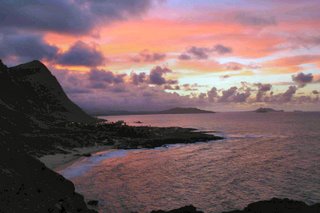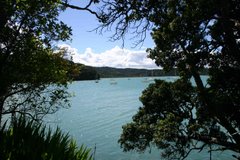
"To know that enough is enough
is to have always enough"
-Tao Te Ching
With the countries, states, proxies, and "states within states" in the Middle East all deciding more violence should be used in order to solve differences (that has worked well in the past 2000 years eh?), the area of the world producing 60% of the oil we use in our economies is again at serious risk of meltdown. Which makes the Peak Oil films at our local cinema last night that much more relevant viewing.
I never much get involved in all the conspiracy theories or "conspiracy facts" as many are claiming now, but the unfolding of events ever since the Twin Towers attack 5 years ago make a compelling study in human behavior as well as the complicated geopolitical mishmash. There comes a time when thinking about life with different fuels for our energy needs is vital, and that time is now. With prices at the pump going up in leaps and bounds, "a line in the sand" will be reached pretty quickly. Creative thinking is necessary, and there are some brilliant incubators out there.
One of the films, called "The Power of Community - How Cuba Survived Peal Oil" was an inspiring documentary on the "Special Period" Cuba faced after the collapse of the Soviet Union, and was suddenly faced with an oil famine. They later worked out some deals with Venezuela, but the period of 1989 -94 saw some very innovative, cooperative and creative ventures in terms of transportation, food production and land use that saw the island state not only pull through, but really transorm their whole society with more sustainable use of energy.
What is not so inspiring is the behavior of one of our world leaders, who honestly, doesn't seem to have a clue. Russell Brown from Public Address sums it up neatly:
Whoa.
The main thing to realise about this, is there is currently no advanced alternative preparation to a scenario many experts believe is happening in this decade. That is, reaching the full production capacity of all available global oil reserves. As demand continues to rise, the gap between supply (decreasing) and demand (increasing) widens. In the absence of alternate energy sources (which I believe will be developed, just perhaps not in time to ward off some more wars and catastrophes) we will face severe economic hardships, due to the industrial economies so heavily reliant on cheap energy.
I like the opportunity living on an island gives me to work with others in preparing for the challenges ahead, and in particular food production, where every calorie of food produced today with unsustainable practices, takes 10-16 calories of hydrocarbon input. That simply will not be available soon, if we are to believe the geologists, so another way of producing food is, well, quite important. It's called organic farming, or sustainble agriculture, and it is more about working with the planet instead of against it.
Just to leave on a lighter note, Jon Stewart again gets to the point in this great little piece about the internet here.
Enjoy.
I never much get involved in all the conspiracy theories or "conspiracy facts" as many are claiming now, but the unfolding of events ever since the Twin Towers attack 5 years ago make a compelling study in human behavior as well as the complicated geopolitical mishmash. There comes a time when thinking about life with different fuels for our energy needs is vital, and that time is now. With prices at the pump going up in leaps and bounds, "a line in the sand" will be reached pretty quickly. Creative thinking is necessary, and there are some brilliant incubators out there.
One of the films, called "The Power of Community - How Cuba Survived Peal Oil" was an inspiring documentary on the "Special Period" Cuba faced after the collapse of the Soviet Union, and was suddenly faced with an oil famine. They later worked out some deals with Venezuela, but the period of 1989 -94 saw some very innovative, cooperative and creative ventures in terms of transportation, food production and land use that saw the island state not only pull through, but really transorm their whole society with more sustainable use of energy.
What is not so inspiring is the behavior of one of our world leaders, who honestly, doesn't seem to have a clue. Russell Brown from Public Address sums it up neatly:
... WTF is up with Bush? In the midst of a major crisis in the Middle East there was his inadvertently broadcast chat with Tony Blair, in which he appears incapable of sustaining any gravity and possessed of an understanding of the situation that might kindly be described as folksy. And then there's this: Bush walked into the room for an important summit and gave the German Chancellor, Angela Merkel, an uninvited neck massage, by which she was surprised and apparently not pleased. I'm sorry, but that's just weird. Photos and video via AmericaBlog.Just googling Peak Oil comes up with hundreds of pages filled with facts and figures researched and presented (for the most part) by qualified and experienced scientists and engineers who realise the gravity of the situation and feel the need to shout from the nearest hilltop, or in this case, blog. Matt Simmons, longtime energy analyst, and author of Twilight in the Desert, compared the crisis with global warming, which in his view would receive a 3 on scale of 1o, with Peak Oil a 12.
Whoa.
The main thing to realise about this, is there is currently no advanced alternative preparation to a scenario many experts believe is happening in this decade. That is, reaching the full production capacity of all available global oil reserves. As demand continues to rise, the gap between supply (decreasing) and demand (increasing) widens. In the absence of alternate energy sources (which I believe will be developed, just perhaps not in time to ward off some more wars and catastrophes) we will face severe economic hardships, due to the industrial economies so heavily reliant on cheap energy.
I like the opportunity living on an island gives me to work with others in preparing for the challenges ahead, and in particular food production, where every calorie of food produced today with unsustainable practices, takes 10-16 calories of hydrocarbon input. That simply will not be available soon, if we are to believe the geologists, so another way of producing food is, well, quite important. It's called organic farming, or sustainble agriculture, and it is more about working with the planet instead of against it.
Just to leave on a lighter note, Jon Stewart again gets to the point in this great little piece about the internet here.
Enjoy.




1 comment:
Greets to the webmaster of this wonderful site! Keep up the good work. Thanks.
»
Post a Comment